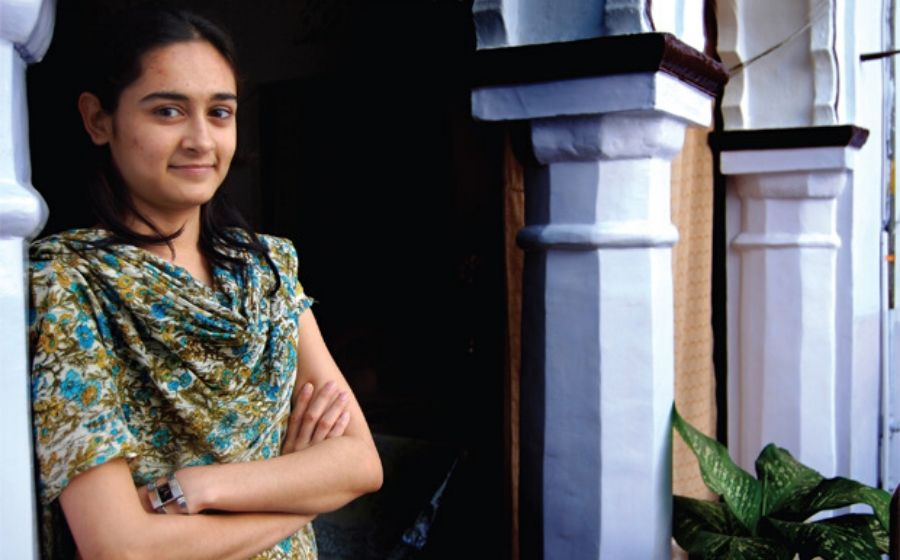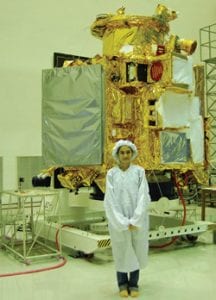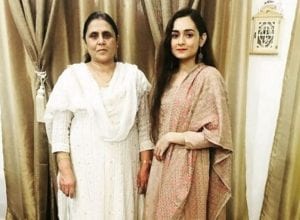
How a Muslim girl from a small UP town came to be called 'Moon Girl'

Chaugori Mohalla is a small Muslim neighbourhood in Uttar Pradesh’s Amroha town, about 200 km from Delhi. To reach the place, one needs to get off NH-24 from Itarsi, about 40 km before Moradabad, and a bumpy 10-km drive on a rough and dusty road would lead to the destination.
The narrow lane has old concrete houses with Urdu nameplates. Men wearing skull caps and women clad in burqas still give the locality a traditional look. Amroha, which is inhabited by both Hindus and Muslims, is called Aman Ki Nagri (town of peace). It has never witnessed a communal riot.
Hailing from this nondescript peaceful town is a young woman, Khushboo Mirza who is locally known as the woman who went to moon. Not for nothing, she has now reached the position of a director-level grade of Scientist F at the Indian Space Research Organisation (ISRO) and was part of the teams of Chandrayaan 1 and Chandrayaan 2 missions.
Khushboo is thrilled over her recent promotion which means she is just two levels below that of the position held by Abdul Kalam and the incumbent ISRO chairperson, Dr K Sivan.
But her life was not without troubles. Born on July 24, 1985, Khushboo lost her father Sikandar Mirza when she was just seven years old. In an unusual move, her mother Farhat broke religious norms to run her husband’s petrol pump to send her children to school. Khushboo studied in a Hindi-medium school till Class 10. She applied for B.Tech at Aligarh Muslim University (AMU) and bagged the seat under the sports quota as she was a volleyball player.

When Khushboo graduated in 2006, she was offered a software engineer job by American multinational company Adobe. But she applied to ISRO as she wanted to serve “Indian Science”. After joining the space agency, she was first drafted into the dedicated team for the Chandrayaan 1 mission in 2008. Khushboo received the ISRO Team Excellence Award in April 2015. She was also a part of the Chandrayaan 2 mission in 2019.
Even when she was accomplishing achievements in the space, her mother had to face criticism from some of the villagers. But Farhat ignored them and travelled with her daughter to ISRO training programmes across the country.
Khushboo then sought Farhat’s permission to shed the burqa and wear jeans to work. “She wanted to wear jeans, and I allowed her,” Farhat said. “In the absence of her father, and given the fact that she had to travel miles, many people said a lot of unkind things. But I told my daughter to work hard,” added Farhat.
Khushboo maintained the orthodoxy and tradition, and followed religious norms, but they had no impact on her work.
“I do follow our religion and do Namaz five times a day, besides observing fast during the fasting period. But I also wear western clothes. We belong to a progressive family, where modernity can exist along with tradition,” said Khushboo, who once celebrated Eid with her colleagues in an ISRO lab.
She has reached such heights that schools and colleges in Uttar Pradesh invite her to give talks. She keeps telling children, particularly girls, to concentrate on education which alone can provide them with a good future. She has also impressed many Muslim girls to consider education seriously. Khushboo feels that the necessary facilities for primary and high school education in the villages must be stepped up.

Many people in Uttar Pradesh think that she had made a journey to the moon and congratulate her and this why she is called the Moon Girl. Khushboo has emerged as a Muslim icon and a woman icon in Uttar Pradesh. Neither Khushboo nor her family members stereotype women, especially Muslim women. They believe that anyone in the country can fare well if they are provided with a good education.
With education and hard work, success is bound to come. There is no need to bring in religion or orthodoxy here, she said. “Times have changed and the attitude of people towards Muslim girls also needs to change. Our families do educate us.”
The success story of Khushboo Mirza is expected to inspire girls across the country and persuade families to educate their children, raising hopes of a better future not just for these families but the whole country.


